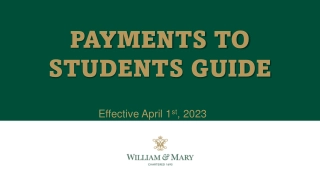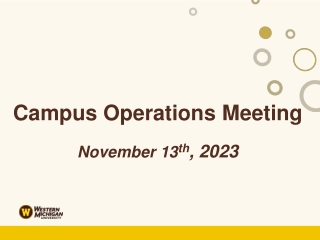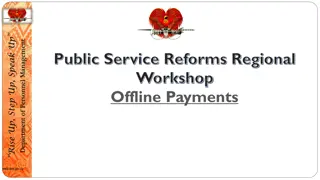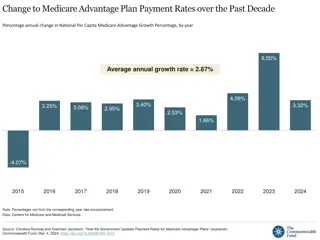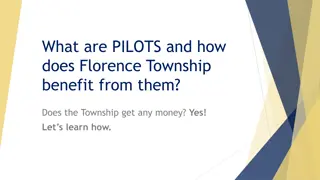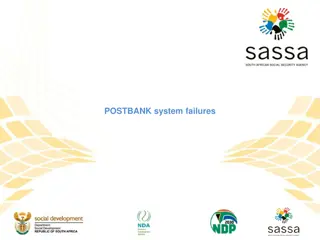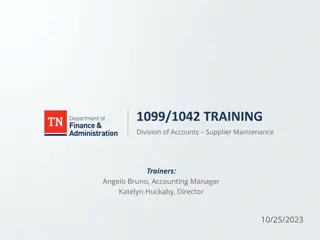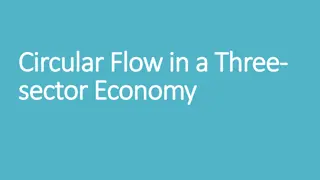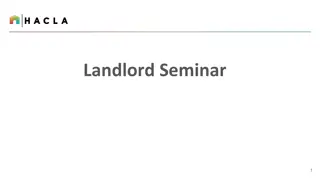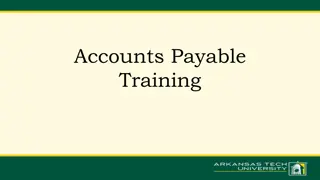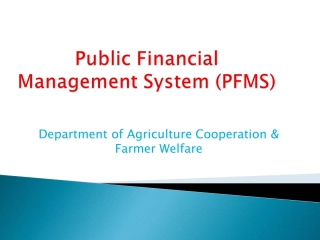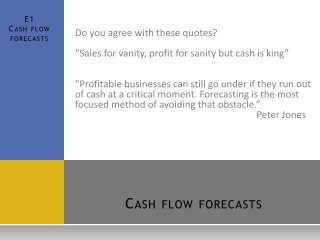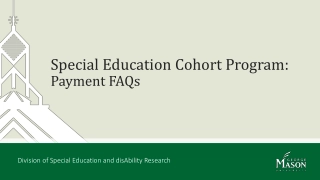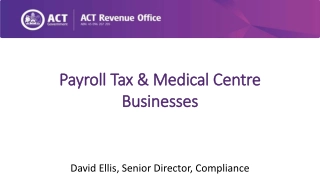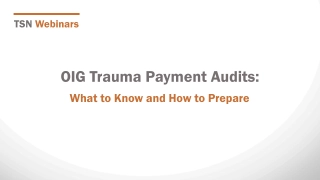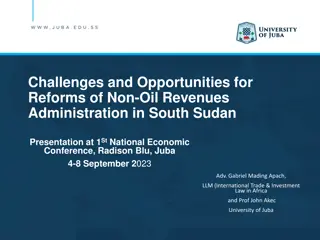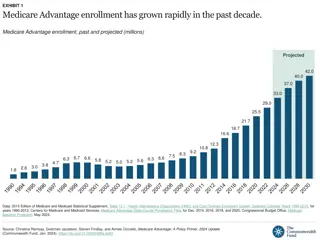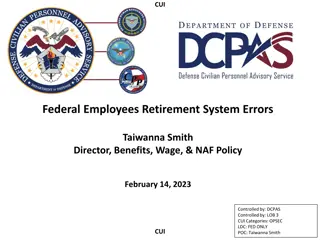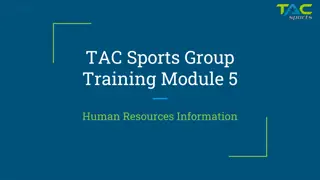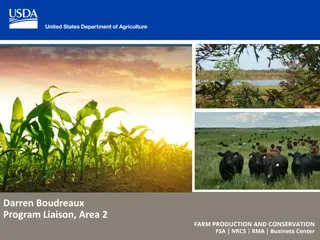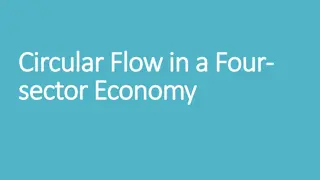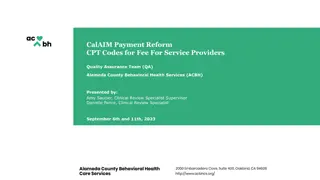Behested Payments
Explore the concept of behested payments, how they are regulated under local laws, who is subject to the ordinance, and who qualifies as interested parties. Learn about disclosure requirements, prohibited solicitations, and the impact on governmental conduct and ethics.
Download Presentation
Please find below an Image/Link to download the presentation.
The content on the website is provided AS IS for your information and personal use only. It may not be sold, licensed, or shared on other websites without obtaining consent from the author. Download presentation by click this link. If you encounter any issues during the download, it is possible that the publisher has removed the file from their server.
Presentation Transcript
Behested Payments JULY 24, 2023 DEPUTY CITY ATTORNEYS LAUREN CURRY & BRAD RUSSI
Behested Payments 1. Background on behested payments 2. Discussion of current behested payment ordinance 3. Hypothetical scenarios 4. Questions
Behested Payments - Background What is a behested payment? A payment made at the behest of an officer, or an agent thereof, and that is made principally for a legislative, governmental, or charitable purpose Generally donations to non-profits or the City
Behested Payments - Background Local law - Campaign & Governmental Conduct Code Section 3.600, et seq Initially, a more demanding disclosure requirement than State law. Required commissioners and elected officials to report soliciting payments of $1,000 or more from interested parties BOS passes Ordinance No. 232-21 - tightens the ordinance; a prohibition Proposition E - June 2022 ballot measure to protect the ordinance Ordinance No. 204-22 Main concern was attempt to influence prong of interested party definition Ethics Regulations in February 2023 to help implement the ordinance.
Behested Payments Ordinance - Basics Who is subject to the behested payments ordinance? All Form 700 filers includes elected officials, department heads, commissioners, and all employees who file What does the ordinance require? Covered City officers and employees may not solicit behested payments from interested parties Analysis focuses on who the official is asking, not where the donation is going.
Behested Payments Ordinance - Basics Who is an interested party? Department contractors Persons who have attempted to influence the official regarding contracting decisions Parties, participants, and agents involved in administrative enforcement and permitting/entitlement proceedings Lobbyists and their clients Permit consultants
Behested Payments Ordinance Interested Parties - Contractors Who is an interested party? Contractors Department contractors or parties seeking department contracts, including affiliates of contractors applies to the entire department Applies to contracts valued over $100,000/FY Affiliates of contractors are: Members of an entity s board of directors and entity s principal officers, including its chairperson, CEO, CFO, COO, any person with an ownership interest of more than 10% in the entity, and any subcontractor listed in the entity s bid or contract. Applies from the submission of a proposal until the termination of negotiations for the contract; or, in the case of the party that has received a contract, 12 months after the end of the contract s term unless five years have elapsed since the execution of the contract or any contract amendment. EXCLUDED Grants to the City; MOUs with Friends
Behested Payments Ordinance Interested Parties Influencing Contracts Who is an interested party? Any person who attempted to influence the official regarding a contracting decision within the past 12 months
Behested Payments Ordinance Interested Parties Administrative Proceedings Who is an interested party? Administrative proceedings Party, participant, or agent involved in a proceeding regarding administrative enforcement, a license, permit, or other entitlement for use, pending before the department head or commission Interested parties for entire department Party, participant, or agent involved in a proceeding regarding administrative enforcement, a license, permit, or other entitlement for use, in which the officer or employee was personally or substantially involved Interested parties for the employees involved in the matter
Behested Payments Ordinance Interested Parties Administrative Proceedings Who is an interested party? Administrative proceedings License, permit, or other entitlement for use land use permits and decisions, or other entitlements to use property or engage in business, issued in the discretion of the administering agency Party - any person who files an application for, or is the subject of, a proceeding Participant - any person who is not a party but who actively supports or opposes (by lobbying in person, testifying in person, or otherwise acting to influence) a particular decision and who has a financial interest in the decision Agent - any person who represents a party in connection with a proceeding EXCLUDED ministerial permits, where issued by checking boxes, little to no discretion, first come first serve e.g., picnic table permits
Behested Payments Ordinance Interested Parties Lobbyists & Permit Consultants Who is an interested party? Lobbyists Lobbyists registered to lobby department Any client of a lobbyist on whose behalf the lobbyist contacted the department in the past 12 months includes affiliates of clients (members of their board and officers) Permit consultants registered to the department
Behested Payments Ordinance Exceptions Solicitations The following types of solicitations are exempt Solicitations for donations of less than $1,000 (but may only ask for up to $1,000 total in a 12-month period, even if the donation doesn t happen) Public appeals - television, radio, billboard, a public message on an online platform, the distribution of 200 or more identical pieces of printed material, the distribution of a single email to 200 or more recipients, or a speech to a group of 20 or more individuals Waivers BOS can waive for particular purpose prospectively; only up to 6 months at a time
Hypothetical #1 Q. Jim works at DBI and is required to file a Form 700. He happens to get assigned to review a permit application from his friend, Mirabelle. Can Jim ask Mirabelle to donate to Jim s favorite charity?
Hypothetical #1 Q. Jim works at DBI and is required to file a Form 700. He happens to get assigned to review a permit application from his friend, Mirabelle. Can Jim ask Mirabelle to donate to Jim s favorite charity? A. No. Jim was personally involved in reviewing the permit, so for the next 12 months, Mirabelle is an interested party to him and he may not solicit any payments from her. The ordinance exempts payments less than $1,000, but note that other laws regulating quid pro quos could apply. The ordinance exempts purely ministerial permits, but this exception is narrow.
Hypothetical #2 Q. Jim works at DBI and is required to file a Form 700. He does not review permits, but he learns that his friend, Mirabelle, just filed for one. Can Jim ask Mirabelle to donate to Jim s favorite charity?
Hypothetical #2 Q. Jim works at DBI and is required to file a Form 700. He does not review permits, but he learns that his friend, Mirabelle, just filed for one. Can Jim ask Mirabelle to donate to Jim s favorite charity? A. It depends. Mirabelle could be an interested party to Jim if the department head or commission will need to approve the permit. But if Mirabelle s permit application will be handled at the staff level, then Mirabelle will not be an interested party to Jim, because he was not personally and substantially involved.
Questions? Future questions feel free to reach out Ethics Commission website is a good resource


